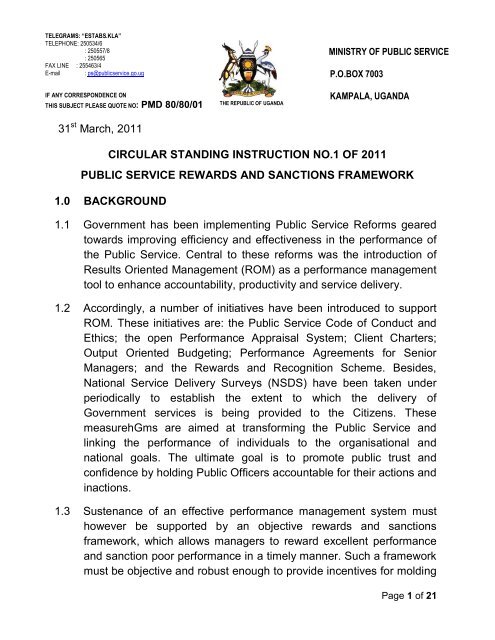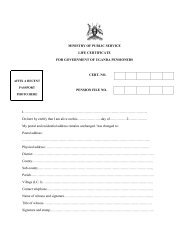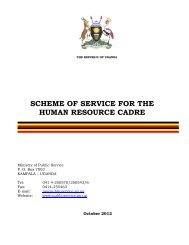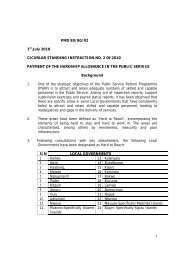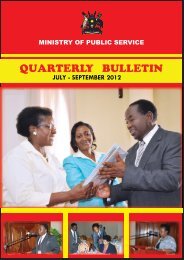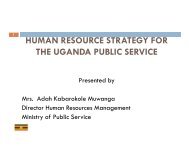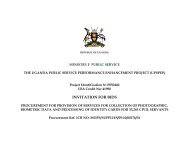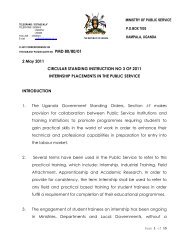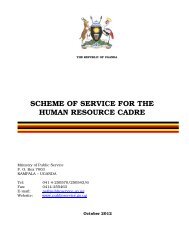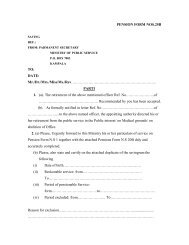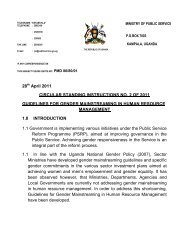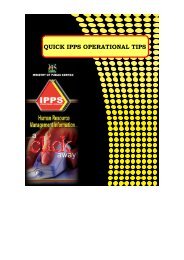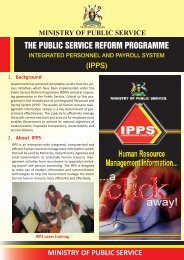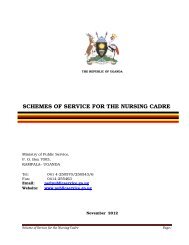31 March, 2011 CIRCULAR STANDING INSTRUCTION NO.1 OF ...
31 March, 2011 CIRCULAR STANDING INSTRUCTION NO.1 OF ...
31 March, 2011 CIRCULAR STANDING INSTRUCTION NO.1 OF ...
You also want an ePaper? Increase the reach of your titles
YUMPU automatically turns print PDFs into web optimized ePapers that Google loves.
TELEGRAMS: “ESTABS.KLA”<br />
TELEPHONE: 250534/6<br />
: 250557/8<br />
: 250565<br />
FAX LINE : 255463/4<br />
E-mail<br />
: ps@publicservice.go.ug<br />
IF ANY CORRESPONDENCE ON<br />
THIS SUBJECT PLEASE QUOTE NO: PMD 80/80/01<br />
THE REPUBLIC <strong>OF</strong> UGANDA<br />
MINISTRY <strong>OF</strong> PUBLIC SERVICE<br />
P.O.BOX 7003<br />
KAMPALA, UGANDA<br />
<strong>31</strong> st <strong>March</strong>, <strong>2011</strong><br />
<strong>CIRCULAR</strong> <strong>STANDING</strong> <strong>INSTRUCTION</strong> <strong>NO.1</strong> <strong>OF</strong> <strong>2011</strong><br />
PUBLIC SERVICE REWARDS AND SANCTIONS FRAMEWORK<br />
1.0 BACKGROUND<br />
1.1 Government has been implementing Public Service Reforms geared<br />
towards improving efficiency and effectiveness in the performance of<br />
the Public Service. Central to these reforms was the introduction of<br />
Results Oriented Management (ROM) as a performance management<br />
tool to enhance accountability, productivity and service delivery.<br />
1.2 Accordingly, a number of initiatives have been introduced to support<br />
ROM. These initiatives are: the Public Service Code of Conduct and<br />
Ethics; the open Performance Appraisal System; Client Charters;<br />
Output Oriented Budgeting; Performance Agreements for Senior<br />
Managers; and the Rewards and Recognition Scheme. Besides,<br />
National Service Delivery Surveys (NSDS) have been taken under<br />
periodically to establish the extent to which the delivery of<br />
Government services is being provided to the Citizens. These<br />
measurehGms are aimed at transforming the Public Service and<br />
linking the performance of individuals to the organisational and<br />
national goals. The ultimate goal is to promote public trust and<br />
confidence by holding Public Officers accountable for their actions and<br />
inactions.<br />
1.3 Sustenance of an effective performance management system must<br />
however be supported by an objective rewards and sanctions<br />
framework, which allows managers to reward excellent performance<br />
and sanction poor performance in a timely manner. Such a framework<br />
must be objective and robust enough to provide incentives for molding<br />
Page 1 of 21
the behavior of employees and to cultivate a performance culture that<br />
focuses on results, excellence and professionalism.<br />
2.0 CURRENT SITUATION<br />
2.1 A number of regulations and disciplinary procedures are detailed in<br />
the Public Service Act, the Uganda Government Standing Orders, the<br />
Code of Conduct and Ethics for the Public Service, the Public Service<br />
Commission Regulations, and the Rewards and Recognition<br />
Scheme.<br />
2.2 Although the regulations provide for measures and procedures to<br />
deal with indiscipline, their enforcement is still weak and slow. The<br />
focus is on rewarding and recognizing good performance.<br />
Sanctioning poor performance as a means of improving performance<br />
is not being addressed. This has been confirmed by Public Service<br />
Inspection Reports, the Local Government Reports, the Service<br />
Commission Reports and the Joint Government/Development<br />
Partners’ Reports.<br />
2.3 The current system has the following weaknesses:<br />
a) The rewards have not been applied in a standard manner across<br />
the Service. Hence there is a lot of inconsistency in the<br />
implementation.<br />
b) The rewards are not significant enough to cause change in<br />
behavior and to encourage exertion of extra effort.<br />
c) The criteria for nominating best performers has been challenged<br />
resulting in discontent.<br />
d) The criteria for reward or recognition places little emphasis on<br />
promoting innovativeness.<br />
e) The focus on rewarding individuals does not allow enough<br />
recognition of the collective and collaborative efforts by teams to<br />
deliver key outputs.<br />
Page 2 of 21
3.0 THE REWARDS AND SANCTIONS FRAMEWORK<br />
In order to address the above shortcomings, a Rewards and<br />
Sanctions Framework has been developed to provide a range of<br />
rewards and sanctions to be enforced in the Public Service. The<br />
Framework provides the principles and the criteria to be followed as<br />
well as the Institutional arrangements. Specifically the Framework<br />
shall:<br />
a) facilitate recognition of employee performance, achievements,<br />
innovations and contributions;<br />
b) guide the management and sanctioning of poor performance at<br />
the corporate, team and individual levels;<br />
c) support a working environment that values employees and<br />
facilitates a workplace that motivates and encourages high<br />
performance; and<br />
d) Provide for rewarding and sanctioning of Public Officers as<br />
individuals or as members of a team.<br />
4.0 OBJECTIVES <strong>OF</strong> THE FRAMEWORK<br />
4.1 Overall Objective<br />
The overall objective of the Rewards and Sanctions Framework is to<br />
create a competitive work environment that supports a culture of<br />
continuous search for improvements in performance, productivity,<br />
innovation and service delivery.<br />
4.2 Specific Objectives<br />
The specific objectives of the framework are to:<br />
a) enhance consistency, transparency and objectivity in application<br />
of rewards and sanctions in the Public Service;<br />
b) introduce sanctions to promote better performance;<br />
c) promote innovation in public service performance and delivery;<br />
Page 3 of 21
d) introduce financial rewards in addition to the already existing non<br />
financial rewards; and<br />
e) Increase the value of rewards and the intensity of the<br />
consequences of sanctions.<br />
5.0 GUIDING PRINCIPLES<br />
The implementation of Rewards and Sanctions in the Public Service<br />
shall be guided by the following principles:<br />
Transparency:<br />
Impartiality :<br />
Results<br />
Orientation:<br />
Affordability:<br />
Timeliness:<br />
Flexibility:<br />
There shall be openness and sharing of<br />
information in rewarding good performance and<br />
sanctioning poor performance.<br />
In rewarding and sanctioning performance there<br />
shall be fairness, irrespective of gender, race,<br />
religion, disability or ethnic background.<br />
The extent to which performance of individuals,<br />
teams or organizations impacts on achievement of<br />
organizational or national objectives will be the<br />
basis for rewards or sanctions in the Public<br />
Service.<br />
In determining the nature of rewards, availability of<br />
resources and sustainability shall be taken into<br />
account.<br />
There shall be immediate rewarding of good<br />
performance for greater impact. Likewise,<br />
immediate sanctioning shall be taken against poor<br />
performance.<br />
The rewards and sanctions may be customized to<br />
take into account peculiar conditions that pertain in<br />
a given Public Service entity.<br />
Page 4 of 21
6.0 APPLICABILITY<br />
The Public Service Rewards and Sanctions Framework shall apply to<br />
all Ministries, Departments, Agencies and Local Governments at<br />
Corporate; Team (Directorates, Departments, Divisions, Sections,<br />
Units, Task Teams); and individual levels.<br />
7.0 CRITERIA FOR APPLICATION <strong>OF</strong> A REWARD OR SANCTION<br />
7.1 Criteria for Applying Rewards<br />
To qualify for a reward, institutions, teams or individuals must satisfy<br />
a number of conditions.<br />
7.1.1 Conditions for Rewards at Institutional Level<br />
a) Achievement of all performance targets as outlined in the<br />
institutional performance plans outlined in the Ministerial Policy<br />
Statement and the Budget Framework Papers.<br />
b) Evidence of fulfillment of key service standards outlined in client<br />
charters.<br />
c) Sponsorship of an innovation that results in efficiency, economy<br />
and effectiveness.<br />
d) Demonstration of outstanding contribution towards national<br />
development goals outlined in the National Development Plan<br />
(NDP).<br />
e) Achievement of results as reflected in the Government<br />
Assessment Report.<br />
7.1.2 Conditions for rewards at Team level<br />
To qualify for a reward, a Team must demonstrate the following:<br />
a) Achievement of all performance targets as outlined in the<br />
performance plans, and the terms of reference in case of Task<br />
Teams.<br />
Page 5 of 21
) Sponsorship of an innovation that results in efficiency, economy<br />
and effectiveness.<br />
c) Demonstration of outstanding contribution towards achievement<br />
of organizational goals.<br />
7.1.3 Conditions for Rewards at Individual Level<br />
To qualify for a reward, an individual must achieve one or a<br />
combination of the following:<br />
a) Individuals must exceed key commitments outlined in their<br />
performance plans.<br />
b) Sponsorship of an innovation that results in efficiency, economy<br />
and effectiveness.<br />
c) Demonstration of outstanding contribution towards achievement<br />
of organizational goals<br />
d) Exhibition of a good image of a Public Officer or the Public<br />
Service by exceptionally observing the Code of Conduct and<br />
Ethics for the Public Service.<br />
7.2 Criteria for Applying Sanctions<br />
Application of sanctions to institutions, teams or individuals shall be<br />
based on the following conditions:<br />
7.2.1 Conditions for Sanctions at institutional level<br />
Sanctions shall be applied in cases of failure by an institution to:<br />
a) Achieve half of the key deliverables as outlined in the performance<br />
plans agreed upon under the Ministerial Policy Statements, the<br />
Budget Framework Papers, and the Joint Assessment Framework.<br />
b) Fulfill key service standards as outlined in the Client Charters.<br />
c) Adhere to the Public Finance and Accountability Act and the<br />
Leadership Code.<br />
Page 6 of 21
7.2.2 Conditions for Sanctions at Team level<br />
Sanctions shall be applied in cases of:<br />
a) Failure by a Department or Team to achieve half of the key<br />
deliverables as outlined in the performance plans agreed in the<br />
Budget Framework Papers and Joint Assessment Framework.<br />
b) Being among the last three worst performing Government<br />
Institutions identified under the Government Assessment Report.<br />
7.2.3 Conditions for Sanctions at Individual level<br />
Sanctions shall be applied in cases of failure by a Public Officer to:<br />
a) Achieve half of the key deliverables as outlined in the performance<br />
plans agreed upon under Performance Agreements and the<br />
performance appraisal process.<br />
b) Observe the Code of Conduct and Ethics in the Public Service.<br />
c) Meet performance standards as stipulated in the Client Charters.<br />
d) Adhere to the Public Finance and Accountability Act, the<br />
Leadership Code.<br />
8.0 CATEGORIES <strong>OF</strong> REWARDS AND SANCTIONS<br />
Three categories of rewards and sanctions shall be implemented in<br />
the Public Service.<br />
8.1 Reputational Rewards and Sanctions<br />
a) Reputational Rewards: Interventions that are non financial but<br />
boost one’s ego by exposing excellent performance. These will<br />
include the Head of State Honours; the Minister of Public Service<br />
Award; and the Minister of Local Government Award; Head of<br />
Public Service and Secretary to Cabinet Award; Certificates,<br />
Letters of Recognition or Commendation; plaques, trophies, public<br />
applause, publishing the names and photographs of best<br />
performers.<br />
Page 7 of 21
) Reputational Sanctions: All interventions that are a source of<br />
shame. These include public naming and shaming and other<br />
appropriate disciplinary actions in accordance with the Standing<br />
Orders, Service Commission Regulations and other appropriate<br />
regulations.<br />
8.2 Financial Rewards and Sanctions<br />
a) Financial Rewards: These include increased budget allocations,<br />
bonuses, coupons, and cash.<br />
b) Financial Sanctions: These include reduced budget allocations,<br />
and imposition of fines and penalties and other sanctions in<br />
accordance with Public Finance and Accountability Act.<br />
8.3 Operational Rewards and Sanctions<br />
a) Operational Rewards: These are interventions that provide<br />
operational flexibility and comfort in the management of financial<br />
and non financial resources.<br />
b) Operational Sanctions: These are interventions that withhold or<br />
deny operational flexibility and comfort in the management of<br />
financial and non financial resources.<br />
c) The implementation modalities are detailed in Annex 1.<br />
9.0 INSTITUTIONAL ARRANGEMENTS<br />
a) The Ministry of Public Service will oversee the implementation of<br />
the Rewards and Sanctions Framework.<br />
b) There will be a Corporate Rewards and Sanctions Committee at<br />
national level.<br />
c) A Rewards and Sanctions Committee will be established in every<br />
Ministry, Department or Local Government. These Committees will<br />
replace the Disciplinary Committees.<br />
Page 8 of 21
d) The implementation of the rewards and sanctions in the Public<br />
Service will be a shared responsibility of all Public Officers,<br />
supervisors and managers. Key among these are the Political<br />
leaders in Ministries and Local Governments, Head of Public<br />
Service and Secretary to Cabinet, Responsible Officers, Heads of<br />
Department, Supervisors and Heads of Human Resource Division.<br />
e) The roles and responsibilities for the key institutions and actors are<br />
detailed in Annex 2 and 3.<br />
10.0 INFORMATION, EDUCATION & COMMUNICATION PROGRAMME<br />
a) All Public Officers should be aware of the rewards and sanctions<br />
applicable in the Public Service. In this regard, Ministry of Public<br />
Service will develop and implement a comprehensive information,<br />
education and communication programme in respect of the<br />
Rewards and Sanctions Framework.<br />
b) The sensitization on rewards and sanctions will be included as one<br />
of the sessions at all induction and orientation programs.<br />
11.0 MONITORING AND EVALUATION (M&E) FRAMEWORK<br />
a) The Ministry of Public Service Performance Monitoring Unit will be<br />
responsible for monitoring the implementation of the Rewards and<br />
Sanctions Framework.<br />
b) The implementation of the framework will be monitored through<br />
quarterly reports on disciplinary/absenteeism cases submitted by<br />
the respective Ministries and Local Governments and through<br />
annual reports, in the case of rewards.<br />
c) The Unit will provide technical assistance and support to<br />
Ministries, Departments, Agencies and Local Governments in the<br />
implementation of the framework.<br />
Page 9 of 21
12.0 IMPLEMENTATION ARRANGEMENTS<br />
The implementation of this Circular takes effect from 1 st July <strong>2011</strong>.<br />
Responsible Officers are required to circularise the Public Service the<br />
contents of this Circular for implementation and compliance. The<br />
Circular can be accessed on the Ministry of Public Service.<br />
Website: www.publicservice.go.ug.<br />
Jimmy R. Lwamafa<br />
PERMANENT SECRETARY<br />
Distribution “B”<br />
Page 10 of 21
Annex 1<br />
FRAMEWORK FOR IMPLEMENTING REWARDS AND SANCTIONS AT INDIVIDUAL,<br />
TEAM OR ORGANISATIONAL LEVEL<br />
1. REWARDS<br />
1.1 Rewards at Corporate Level<br />
1.1.1 Reputational Rewards<br />
REWARD<br />
Head of State Honours<br />
Minister of Public Service Award<br />
Minister of Local Government<br />
Award<br />
Head of Public Service and<br />
Secretary Cabinet Award<br />
Other Rewards<br />
IMPLEMENTATION MODALITIES<br />
This will be awarded to the best performing Ministry or<br />
Department; Agency and Local Government by H.E.<br />
the President.<br />
This will be awarded to the second best performing<br />
Ministry or Department; Agency.<br />
This will be awarded to the second best performing<br />
Local Government.<br />
This will be awarded to the third best performing<br />
Ministry or Department; Agency and Local<br />
Government.<br />
a) The best three performing Ministries or<br />
Departments; Agencies and Local Governments<br />
will be publicized in the mass media.<br />
b) Certificates of recognition will be issued to the best<br />
three performing Ministries or Departments;<br />
Agencies and Local Governments.<br />
1.1.2 Financial Rewards<br />
REWARD<br />
Budget allocations<br />
Cash/ Bonuses<br />
IMPLEMENTATION MODALITIES<br />
The Ministry responsible for Finance will explicitly<br />
communicate, in the budget call circular, how past<br />
good performance will have influenced budget<br />
allocations to the best scored/ranked MDAs and LGs<br />
The best three performing MDAs/LGs may be<br />
considered for bonuses.<br />
Page 11 of 21
1.1.3 Operational Rewards<br />
REWARD<br />
Flexibility in the management of<br />
financial resources<br />
IMPLEMENTATION MODALITIES<br />
The Ministry responsible for Finance will provide<br />
special guidelines to grant flexibility to best performing<br />
institutions.<br />
Flexibility in the management of<br />
human resources<br />
The Ministry responsible for Public Service will provide<br />
special guidelines to grant flexibility to best performing<br />
institutions.<br />
1.2 Rewards at Team (Directorate/Department or Division or Unit Level)<br />
1.2.1 Reputational Rewards<br />
REWARD<br />
Minister’s Award<br />
Chairperson LCV/Mayor<br />
Award<br />
Other Rewards<br />
IMPLEMENTATION MODALITIES<br />
a) The Minister of the respective Institution will give an award<br />
to the best performing team.<br />
a) The Chairperson LCV/Mayor of the respective Local<br />
Government will give an award to the best performing<br />
team.<br />
a) The best performing Team will be publicized on all<br />
Institutional Notice Boards.<br />
b) Certificates of Recognition, Plaques, Trophies will be<br />
awarded based on the recommendation of the Reward<br />
and Sanctions Committee<br />
c) The best performing Team will be recognized and<br />
applauded in all appropriate fora, throughout the year.<br />
1.2.3 Financial Rewards<br />
Staff bonuses/Cash/Coupons<br />
The best performing team will be given staff bonus<br />
cash or coupons by the respective Accounting Officers.<br />
Page 12 of 21
1.3 Rewards at Individual Level<br />
1.3.1 Reputational Rewards<br />
REWARD<br />
Responsible Officers’<br />
Award<br />
IMPLEMENTATION MODALITIES<br />
The respective Responsible Officers may award Certificates of<br />
Recognition/Letters, Plaques to the best performing individuals.<br />
Other Rewards<br />
a) Best performing Officers will be publicized on all Institutional<br />
Notice Boards.<br />
b) Certificates of recognition, plaques, trophies may be awarded<br />
based on the recommendation of the Rewards and Sanctions<br />
Committee.<br />
c) The best performing Officers will be recognized and<br />
applauded in appropriate fora throughout the Year.<br />
d) Status symbols e.g. badges, key holders may be given to<br />
outstanding performers<br />
1.3.2 Operational Rewards<br />
Invitation to high level<br />
meetings/functions<br />
Representing Senior<br />
Management<br />
Assignment of more<br />
challenging duties<br />
Outstanding performers may be nominated to attend high<br />
level meetings/ functions.<br />
Best performers may be nominated to represent Senior<br />
Management as and when the Responsible Officer deems<br />
appropriate.<br />
The best performers may be assigned more challenging<br />
and motivating duties.<br />
1.3.3 Financial Rewards<br />
Gifts/Presents<br />
Bonus/ Cash reward<br />
Gifts/ presents may be given to the best performers by the<br />
Responsible Officers.<br />
Best performers may be given Cash rewards/Bonuses/<br />
Shopping Vouchers.<br />
Page 13 of 21
2. SANCTIONS<br />
2.1 Sanctions at Corporate Level<br />
2.1.1 Reputational sanctions<br />
SANCTION<br />
Naming and Shaming<br />
Implementation Modalities<br />
Poor performing institutions will be publicized in all<br />
appropriate fora<br />
2.1.2 Financial Sanctions<br />
Reduced budget allocations<br />
The budgets of the poor performing institutions may be<br />
reduced.<br />
2.2 Sanctions at Team (Directorate/Department/Division/Unit) Level<br />
2.2.1 Reputational Sanctions<br />
SANCTIONS<br />
Internal sanctions<br />
Public shaming<br />
IMPLEMENTATION MODALITIES<br />
Internal sanctions like, warning letters will be administered to<br />
the poor performers.<br />
Results of the poor performers will be publicized in all<br />
appropriate fora<br />
2.2.2 Financial Sanctions<br />
SANCTIONS<br />
Penalty<br />
IMPLEMENTATION MODALITIES<br />
Poor performing Teams may be deprived of certain financial<br />
incentives/benefits e.g bonuses/cash by the respective<br />
Responsible Officers.<br />
2.3 Sanctions at Individual Level<br />
2.3.1 Reputational sanctions<br />
SANCTIONS<br />
Administrative Action<br />
IMPLEMENTATION MODALITIES<br />
Administrative progressive disciplinary action will be taken<br />
against poor performers by the Responsible Officers, in<br />
accordance with the Standing Orders, Service Commission<br />
Page 14 of 21
Specific disciplinary<br />
measures<br />
Regulations and other appropriate regulations.<br />
These include:<br />
a) Warning<br />
b) Severe Reprimand<br />
c) Withholding or deferment of increment<br />
d) Stoppage of increment Suspension of increment.<br />
e) Surcharge or refund.<br />
f) Making good of the loss or damage of public<br />
property/assets<br />
g) Interdiction from duty<br />
h) Reduction in rank<br />
i) Removal from the Public Service in Public Interest<br />
j) Dismissal<br />
Cases of persistent poor performance without justified cause<br />
will be submitted to the respective Service Commissions for<br />
appropriate action.<br />
2.3.3 Financial Sanctions<br />
SANCTIONS<br />
IMPLEMENTATION MODALITIES<br />
Specific disciplinary measures Appropriate disciplinary action will be taken against poor<br />
performers by the Responsible Officers, in accordance<br />
with the Standing Orders, Public Service Commission<br />
Regulations and other appropriate Financial and<br />
Accounting Regulations.<br />
These may include:<br />
a) Warning<br />
b) Severe Reprimand<br />
c) Withholding or deferment of increment<br />
d) Stoppage of increment Suspension of increment.<br />
e) Surcharge or refund.<br />
f) Making good of the loss or damage of public<br />
property/assets<br />
g) Interdiction from duty<br />
h) Reduction in rank<br />
i) Removal from the Public Service in Public Interest<br />
j) Dismissal<br />
Page 15 of 21
Annex 2<br />
INSTITUTIONAL ARRANGEMENTS<br />
1. Ministry of Public Service<br />
Ministry of Public Service will be responsible for:<br />
a) Overseeing the implementation of the Rewards and Sanctions<br />
Framework;<br />
b) Monitoring and evaluating the implementation of the framework;<br />
c) Providing technical assistance and support to Ministries, Departments,<br />
Agencies and Local Governments;<br />
d) Reviewing the framework;<br />
e) Preparing and issuing implementation guidelines; and<br />
f) Receiving and analyzing quarterly and annual reports from Ministries,<br />
Departments, Agencies and Local Governments.<br />
2. Corporate Rewards and Sanctions Committee<br />
A Corporate Rewards and Sanctions Committee (CRSC) will be appointed<br />
by the Head of Public Service. The Committee will, on an annual basis,<br />
determine the level of performance at Ministry, Department, Agency or<br />
Local Government level and recommend appropriate rewards and<br />
sanctions.<br />
2.1 Composition of the Committee<br />
The Committee will be composed of the following:<br />
a) Deputy Head of Public Service/Secretary Administrative Reform as the<br />
Chairperson.<br />
b) Four members of high integrity drawn from the, Private Sector, Civil<br />
Society Organization who are knowledgeable about organizational<br />
performance management and evaluation.<br />
Page 16 of 21
c) One representative from the Public Sector.<br />
d) One representative from the Academia<br />
e) Ministry of Public Service will be the Secretariat.<br />
2.2 Roles and Functions of the Committee<br />
The roles and functions the Corporate Rewards and Sanctions Committee<br />
shall be to:<br />
a) Develop guidelines for scoring and ranking MDAs against<br />
performance indicators applied in the performance<br />
plans/agreements.<br />
b) Consider submissions from the respective Responsible Officers who<br />
deserve recognition for exemplary performance or for sanctioning.<br />
c) Based on the guidelines and submissions from the Responsible<br />
Officers, review the performance of the institution and identify best<br />
and worst performing institutions.<br />
d) Submit to the Head of Public Service nominees for consideration for<br />
annual rewards and recognition by the H.E. the President, the<br />
Minister responsible for Public Service and the Minister responsible<br />
for Local Government.<br />
e) Prepare and publish an annual performance scoring and ranking of<br />
all Ministries, Departments, Agencies and Local Governments.<br />
f) Support the Head of Public Service in identifying appropriate<br />
interventions to improve the performance of poor performing<br />
Ministries, Departments, Agencies and Local Governments.<br />
3.0 Ministry/Department/Local Government Rewards and Sanctions<br />
Committee<br />
Page 17 of 21
Each Ministry/Department/Local Government shall have a Rewards and<br />
Sanctions Committee, constituted by the Responsible Officer to:<br />
a) Develop guidelines for scoring and ranking Teams against<br />
performance indicators applied in the performance plans/agreements.<br />
b) Consider submissions from the respective Heads of Departments who<br />
deserve recognition for exemplary performance or for sanctioning;<br />
c) Based on the guidelines and submissions from the Heads of<br />
Department, review the performance of the team and identify best and<br />
worst performing teams.<br />
d) Submit to the Responsible Officer nominees for consideration for<br />
annual rewards and recognition by, the respective Minister/Chairperson<br />
/Mayor.<br />
e) Prepare and publish an annual performance scoring and ranking of all<br />
teams.<br />
3.1 Composition of the Committee<br />
The Responsible Officer will appoint a person of high integrity as the<br />
Chairperson of the Committee, composed of the following:<br />
a) Chairperson<br />
b) Two retired Public Servants<br />
c) One Civil Society representative<br />
d) One Academia<br />
e) Head of Human Resource (Secretariat)<br />
3.2 Roles and Functions of the Committee<br />
The Committee shall be responsible for:-<br />
a) Receiving, assessing and reviewing nominations for rewarding and<br />
sanctioning nominees.<br />
b) Recommend appropriate rewards and sanctions that will be awarded.<br />
Page 18 of 21
c) Develop guidelines for scoring and ranking nominees against<br />
performance indicators applied in the performance plans/agreements.<br />
d) Consider nominees by Heads of Department who deserve recognition<br />
for exemplary performance or for sanctioning.<br />
e) Submit to the Responsible Officer nominees for consideration for annual<br />
rewards and sanctions.<br />
f) Recommend to the Responsible Officer appropriate interventions to<br />
improve the performance of lowly-scoring Departments.<br />
Page 19 of 21
Annex 3<br />
ROLES AND RESPONSIBILITIES KEY PLAYERS<br />
1. Head of Public Service and Secretary to Cabinet<br />
a) Appointing Members of the National Rewards and Sanctions Committee.<br />
b) Submit the names of the nominees to H.E. the President, the Minister<br />
responsible for Public Service and the Minister responsible for Local<br />
Government.<br />
c) Hosting the ceremony for the third best performing institution.<br />
2. Responsible Officers<br />
The Responsible Officers will have the direct responsibility and accountability for<br />
implementing the Rewards and Sanctions Framework, in their respective<br />
institutions. They will specifically:<br />
a) Ensure effective performance management system in the Ministry,<br />
Department, Agency or Local Government.<br />
b) Observe and adhere to the laid down disciplinary procedures.<br />
c) Enforce the Code of Conduct and Ethics for the Public Service.<br />
d) Ensure that Public Officers are aware of their rights and obligations<br />
e) Establish the Rewards and Sanctions Committee.<br />
f) Ensure that in each financial year, adequate funds are budgeted for the<br />
Reward and sanctions.<br />
g) Ensure constant application and compliance to the Rewards and sanctions<br />
scheme.<br />
h) Provide annual reports on the implementation of the Framework.<br />
i) Prepare and publish an annual scoring and ranking Teams.<br />
3. Heads of Department<br />
a) To identify Public Officers in the department who qualify for rewards or<br />
sanctions in line with this framework.<br />
b) Promote innovation and personal initiative.<br />
c) Support the Heads of Sections /Divisions in delivering to the expected<br />
standards.<br />
Page 20 of 21
4. Supervisors<br />
a) Support and guide staff to deliver on key deliverables in their performance<br />
plans/Agreements.<br />
b) Ensure that Public Officers are aware of their rights and obligations.<br />
c) Identify individual Public Officers and teams for rewarding or Sanctioning in<br />
the line with this framework.<br />
d) Assess performance.<br />
e) Recommend staff for rewards or sanctions.<br />
5. Heads of Human resources Division/Section<br />
a) Sensitize staff about the Rewards and Sanctions Framework.<br />
b) Provide technical advisory services to all employees, supervisors and<br />
managers concerning the framework.<br />
c) Assist the Institution in developing their own awards and sanctions in line with<br />
the principles and objectives spelt out in the Framework.<br />
d) Monitor and evaluate of the implementation of the rewards and sanctions by<br />
the institution.<br />
e) Ensure that approved awards and sanctions are properly and timely<br />
processed.<br />
f) Maintain records of the on rewards and sanctions.<br />
g) Coordinate the awards ceremonies.<br />
Public Officers<br />
a) Meet performance commitments as per the Performance Plan/Agreement.<br />
b) Adhere to the Public Service Code of Conduct and Ethics and other<br />
Professional Codes.<br />
c) Support innovations at the individual or team level.<br />
Page 21 of 21


